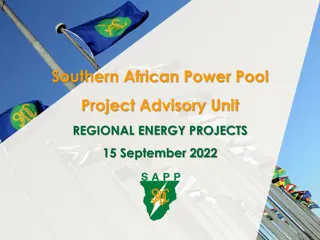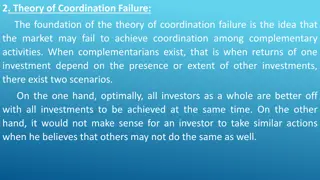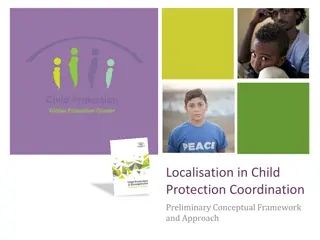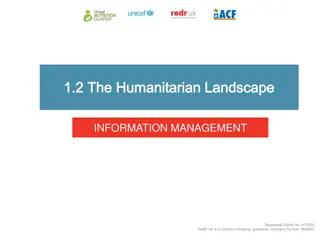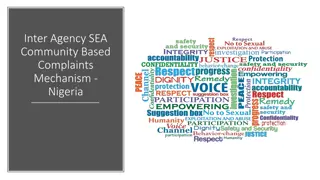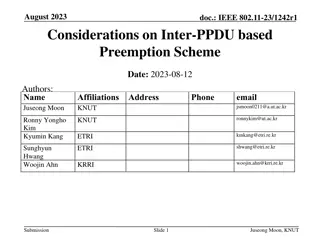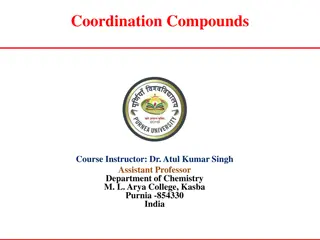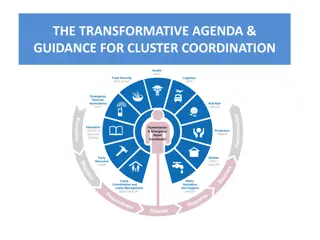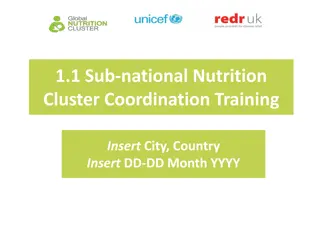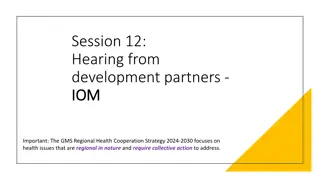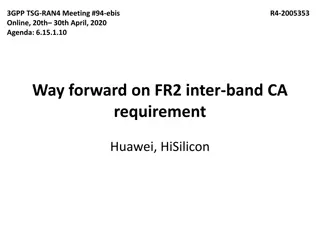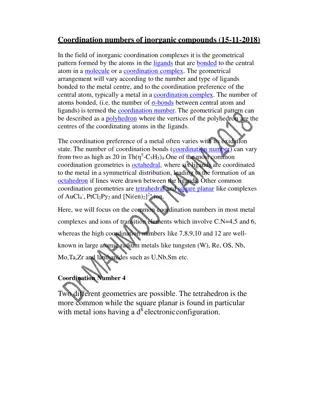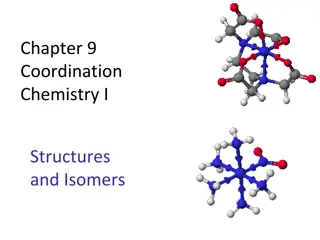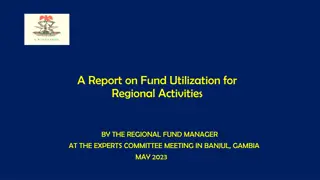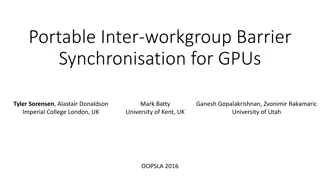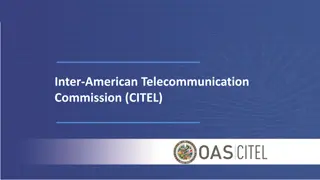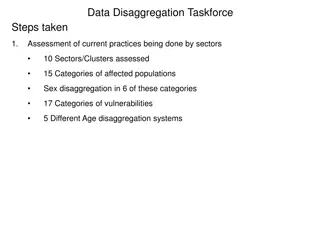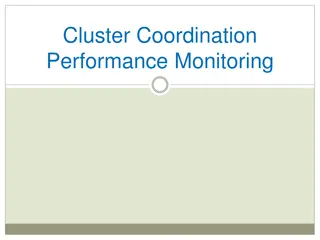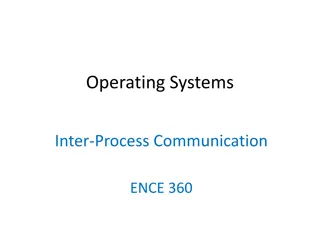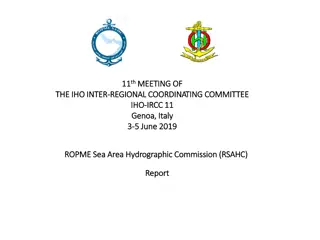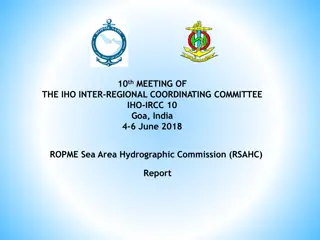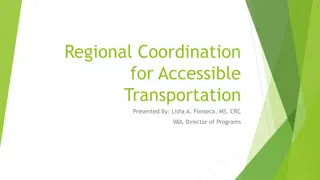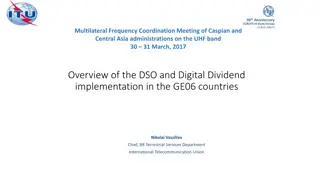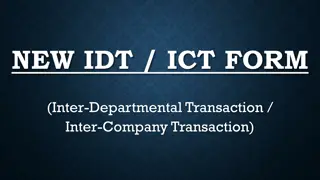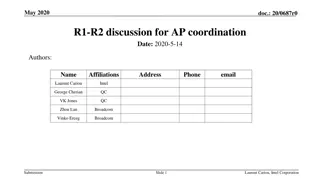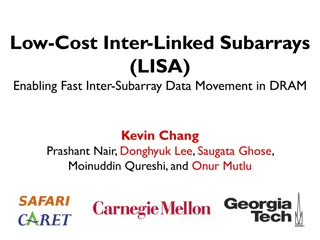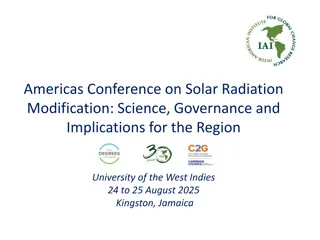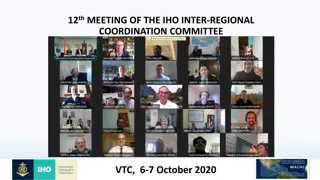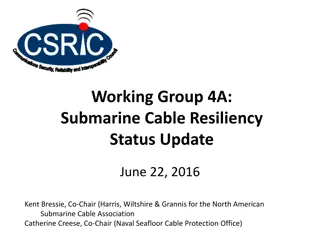Introduction to Co-ordination Chemistry: Fundamentals and Applications
Explore the fascinating field of coordination chemistry, delving into the complexity of compounds and the coordination bonds that govern their structures. Discover the history, key concepts, and applications of coordination chemistry through a detailed examination of coordination compounds, bonding
13 views • 73 slides
Understanding Input-Output Models in Economics
Input-Output models, pioneered by Wassily Leontief, depict inter-industry relationships within an economy. These models analyze the dependencies between different sectors and have been utilized for studying agricultural production distribution, economic development planning, and impact analysis of i
8 views • 7 slides
Guidelines for Upholding Rights of LGBTQ
In light of evolving societal norms and the imperative to safeguard the rights and dignity of LGBTQ individuals and inter-faith\/inter-caste couples, the Supreme Court has given guidelines for the handling of habeas corpus petitions and petitions for police protection.\nBackground:\nRecent instance
9 views • 4 slides
Southern African Power Pool - Regional Energy Projects Overview
The Southern African Power Pool Project Advisory Unit plays a crucial role in coordinating regional energy projects. Established under the World Bank's Program for Accelerating Transformation Energy Projects, the unit identifies, evaluates, and prepares projects in line with the SAPP Pool Plan. Thro
4 views • 17 slides
Understanding the Theory of Coordination Failure in Markets
The theory of coordination failure explores how markets may struggle to achieve coordination among complementary activities, leading to suboptimal outcomes. It highlights scenarios where investors' actions depend on each other, emphasizing the role of government intervention to solve coordination is
2 views • 14 slides
Localisation in Child Protection Coordination: A Conceptual Framework
This presentation explores the preliminary conceptual framework and approach for localisation in child protection coordination. It delves into the roles of local actors, coordination systems, governance, decision-making, partnerships, and funding in promoting localisation efforts. The importance of
0 views • 22 slides
Understanding Humanitarian Landscape and Coordination Challenges
The humanitarian landscape involves various organizations working together to provide assistance during crises. Coordination challenges, such as identifying needs, existing assistance, and government involvement, have been prevalent. The Inter-Agency Standing Committee (IASC) was established in 1991
1 views • 21 slides
Inter-Cluster Coordination and Information Management in Humanitarian Emergencies
Inter-Cluster Coordination and Information Management play vital roles in humanitarian emergencies. The coordination mechanism involves regular meetings convened by the RC/HC and coordinated by OCHA, providing opportunities for clusters to collaborate on shared planning, needs assessments, and poole
3 views • 13 slides
Inter-Agency SEA Community Based Complaints Mechanism in Nigeria
The Inter-Agency SEA Community Based Complaints Mechanism in Nigeria facilitates safe and confidential reporting of complaints, particularly related to sexual exploitation and abuse (SEA), by beneficiaries. Through inter-agency coordination, this mechanism ensures effective collaboration, messaging,
1 views • 18 slides
Considerations on Inter-PPDU Based Preemption Scheme in IEEE 802.11-23
In this document, considerations are presented for a preemption scheme in IEEE 802.11-23, focusing on issues such as coordination, ACK transmission timing, and channel access fairness. The proposed inter-PPDU based preemption scheme aims to improve the transmission of low latency traffics within the
1 views • 12 slides
Understanding Coordination Compounds and Ligands in Chemistry
Coordination compounds involve ligands that donate electron pairs to central metal ions. Ligands can be categorized based on the number of donor atoms they contain, such as mono-, bi-, tri-, tetra-, penta-, and hexadentate ligands. Each type of ligand has the ability to form bonds with the central m
2 views • 15 slides
Transformative Agenda and Guidance for Effective Cluster Coordination
Explore the transformative agenda and guidance for cluster coordination, emphasizing the roles of UNICEF as a cluster lead agency, core cluster functions, inter-cluster coordination, and management strategies for effective humanitarian response. Key focus areas include accountability, human financin
1 views • 19 slides
Managing Inter-Departmental Transfers in Financial Accounting
Inter-departmental transfers involve recording and charging costs from one department to another, with different pricing bases like cost-based and market-based transfers. Unrealized profits in transfers are adjusted using stock reserves. Entries are made at the selling price to include costs and pro
1 views • 7 slides
Sub-national Nutrition Cluster Coordination Training Workshop
Welcome to the Sub-national Nutrition Cluster Coordination Training Workshop aimed at sharing key concepts, tools, and approaches for effective coordination of nutrition in emergencies. This training prepares participants for working in Nutrition Cluster/Sector Coordination, promoting dialogue and s
1 views • 10 slides
Regional Health Cooperation Strategy 2024-2030: Collective Action for GMS
The GMS Regional Health Cooperation Strategy 2024-2030 focuses on addressing regional health issues through collective action. It includes initiatives like strengthening health security, improving health systems towards UHC, and advocating for migrant health rights. The strategy aims to enhance dise
0 views • 5 slides
Enhancing Care Coordination Through Agreements
Effective care coordination is crucial for ensuring quality referrals and improving patient outcomes. Develop a Care Coordination Agreement to streamline the referral process, reduce waste, and enhance cost-effectiveness in healthcare delivery. This agreement serves as a roadmap for standardizing co
0 views • 49 slides
Agreements on FR2 Inter-Band Carrier Aggregation Requirements
Agreements have been reached on the RRM requirements and scaling factors for FR2 inter-band Carrier Aggregation, focusing on common beam and independent beam management. Discussions include alignment with Release 16 specifications, scenarios, and RF architectures. Interruption requirements for diffe
0 views • 8 slides
Coordination Numbers in Inorganic Compounds: Geometries and Structures
In inorganic coordination complexes, the coordination number refers to the number of atoms bonded to the central atom. Common geometries include octahedral, tetrahedral, and square planar, depending on the type and number of ligands. Transition metal complexes exhibit different coordination numbers
2 views • 8 slides
Understanding Coordination Chemistry: Structures, Isomers, and Naming
Exploring coordination chemistry involves understanding structures, isomers, naming conventions, and common coordination numbers, all essential in studying coordination compounds. Coordination compounds consist of central metals, ligands, and charge balancing ions. Naming involves listing cations, l
0 views • 46 slides
Report on Fund Utilization for Regional Activities by the Regional Fund Manager
Clara Atari Ipigansi-Olagbaju, the Regional Fund Manager for WCO-WCA, provides insights into the fund utilization for regional activities at the Experts Committee Meeting in Banjul, Gambia. This report outlines the responsibilities, expectations from regional structures, and the process for making a
0 views • 25 slides
Portable Inter-workgroup Barrier Synchronisation for GPUs
This presentation discusses the implementation of portable inter-workgroup barrier synchronisation for GPUs, focusing on barriers provided as primitives, GPU programming threads and memory management, and challenges such as scheduling and memory consistency. Experimental results and occupancy-bound
0 views • 61 slides
CITEL Working Instruments and Strategic Initiatives for Radiocommunications
Inter-American Telecommunication Commission (CITEL) plays a crucial role in coordinating strategic initiatives related to radiocommunications within the OAS. The Permanent Consultative Committee II (PCC.II) focuses on radiocommunications and works towards preparing for World Radiocommunication Confe
1 views • 10 slides
Challenges in Establishing a Secure Inter-Domain Routing System
The daunting task of creating a secure and trusted inter-domain routing system poses significant challenges due to the decentralized nature of the internet. Addressing issues such as propagation of false routing information, ensuring correct reachability, and dealing with the lack of a clear truth m
0 views • 15 slides
Understanding the Contact Hypothesis in Inter-group Relations
The contact hypothesis explores inter-group relations from a cognitive perspective, highlighting how initial stereotypes and prejudices can be challenged and changed through positive interactions. It emphasizes the importance of contact in altering perceptions and reducing prejudice, as demonstrated
0 views • 42 slides
Data Disaggregation Taskforce: Assessment and Recommendations on Vulnerabilities
The Data Disaggregation Taskforce is conducting an assessment of current practices across sectors, assessing 10 sectors/clusters, 15 categories of affected populations, and identifying vulnerabilities in 17 categories. The Taskforce is working on harmonizing categories and finalizing recommendations
0 views • 6 slides
Understanding Cluster Coordination Performance Monitoring (CCPM)
The Cluster Coordination Performance Monitoring (CCPM) is a self-assessment tool that helps evaluate cluster performance against core functions and Accountability to Affected Populations. It aims to improve coordination and accountability within clusters, developed by the IASC Sub-Working Group. Mon
0 views • 16 slides
Understanding Coordination Complexes and Transition Metals
Today's lecture covers transition elements, coordination complexes, ligand types, geometries, naming, isomers, and bonding in coordination complexes. Transition metals form coordination complexes with metal ions, ligands, and counter ions. The types of ligands include monodentate and bidentate ligan
0 views • 24 slides
Understanding Inter-Process Communication in Operating Systems
Exploring the concept of Inter-Process Communication (IPC) in operating systems, this content delves into how processes cooperate, different IPC paradigms like message passing and shared memory, examples of cooperating processes, and the challenges and advantages of process cooperation. It also addr
0 views • 29 slides
11th IHO Inter-Regional Coordinating Committee Meeting in Genoa, Italy
The 11th Meeting of the IHO Inter-Regional Coordinating Committee (IHO-IRCC) took place in Genoa, Italy from 3-5 June 2019. The meeting discussed various topics related to the ROPME Sea Area Hydrographic Commission (RSAHC) and included representatives from Member States and observers. Key points cov
0 views • 8 slides
10th Meeting of IHO Inter-Regional Coordinating Committee - Goa, India 2018
The 10th meeting of the IHO Inter-Regional Coordinating Committee (IHO-IRCC) took place in Goa, India from 4-6 June 2018. The meeting discussed the activities of the ROPME Sea Area Hydrographic Commission (RSAHC), which aims to promote safe navigation through collaboration on hydrography, cartograph
0 views • 10 slides
Understanding Regional Coordination for Accessible Transportation
This presentation delves into the concept of regional coordination in accessible transportation, focusing on the Regional Transportation Advisory Panel, 5-year regional transportation goals, and the significance of the Safe, Accountable, Flexible, Efficient Transportation Equity Act. It emphasizes t
0 views • 16 slides
Overview of Multilateral Frequency Coordination Meeting for Digital Dividend Implementation
The Multilateral Frequency Coordination Meeting discussed progress in implementing digital switchover and digital dividend in the GE06 countries. It highlighted the allocation of spectrum for mobile services and the importance of coordinated implementation. Various coordination groups in Region 1 wo
0 views • 14 slides
New IDT/ICT Form: Streamlining Inter-Departmental and Inter-Company Transactions
Streamline inter-departmental and inter-company transactions with the new IDT/ICT form. Easily transfer funds between different departments within the same company and across different companies. Two identical forms cater to Foundation and Philanthropic accounts, enhancing efficiency in financial pr
0 views • 13 slides
Enhancing Healthcare Emergency Preparedness and Response in Wisconsin
The Wisconsin Hospital Emergency Preparedness Program (WHEPP) focuses on supporting hospitals in planning and responding to mass casualty incidents and pandemics. It emphasizes the importance of healthcare coalitions, tier coordination, and disaster medical coordination centers. The program, funded
0 views • 30 slides
Proposal for Release 1/R2 Feature Split in Wireless AP Coordination
The proposal suggests modifying the split between Release 1 and Release 2 features for wireless AP coordination in order to address the lack of consensus on the low complexity AP coordination feature. It aims to enhance clarity and efficiency in the development process while maintaining the value of
0 views • 7 slides
Efficient Inter-Company Netting Solutions for Multinational Corporations
Gain insights into the need for multi-currency inter-company netting systems, their benefits, limitations, and tips for successful implementation. Address global challenges in netting to streamline processes, reduce costs, enhance visibility, and improve efficiency in managing inter-company transact
0 views • 14 slides
Enhancing Data Movement Efficiency in DRAM with Low-Cost Inter-Linked Subarrays (LISA)
This research focuses on improving bulk data movement efficiency within DRAM by introducing Low-Cost Inter-Linked Subarrays (LISA). By providing wide connectivity between subarrays, LISA enables fast inter-subarray data transfers, reducing latency and energy consumption. Key applications include fas
0 views • 49 slides
Inter-American Institute and Regional Collaboration on Global Change Research
The Inter-American Institute (IAI) aims at enhancing regional cooperation for interdisciplinary research on global change, focusing on various aspects such as ecosystems, biodiversity, socio-economic impacts, and technologies. The institute promotes scientific excellence, international cooperation,
0 views • 26 slides
International Hydrographic Organization Inter-Regional Coordination Committee Meeting Highlights
The 12th meeting of the IHO Inter-Regional Coordination Committee focused on various key agenda items, including reports on capacity building, education requirements, and initiatives for empowering women in hydrography. Discussions also covered ocean mapping activities, the Seabed 2030 Project, and
0 views • 9 slides
Submarine Cable Resiliency Update and Recommendations
Working Group 4A provides updates on the status of submarine cable resiliency, highlighting the risks to infrastructure due to lack of coordination across agencies and clustering of cable routes. The group aims to enhance regulatory coordination and promote geographic diversity to ensure network res
0 views • 7 slides



